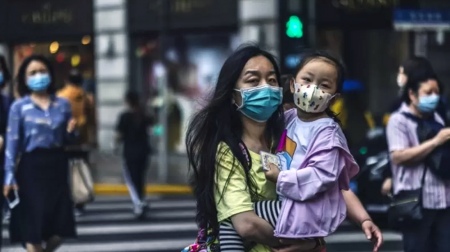The International Monetary Fund (IMF) highlighted the best prospects for China, whose annual growth it expects to be 5.2%, but warned of the “headwinds” in its economy and, in light of this, recommended a fiscal policy and expansive monetary policy, in addition to long-term reforms.
Hand in hand with the lifting of restrictions linked to the Coronavirus pandemic last November, the IMF revised its growth forecast for China upwards this month from 3% to 5.2%.
In 2022, the expansion was only 3%the lowest annual growth since the 1970s, not counting 2020 marked by the pandemic.
“This is good news for China and also for the world as its economy is now expected to contribute a quarter of global growth this year,” said Diego Cerdeiro, an economist at the IMF’s Asia-Pacific Department, and chief of the Fund’s mission to China, Sonali Jain-Chandra in a post on the Fund’s blog.
China’s role in global growth is such that, if the growth rate grows by 1 percentage point, those of other countries do so by 0.3 percentage points, according to recent calculations by the Fund.
“This is good news for China and also for the world as its economy is now expected to contribute a quarter of global growth this year.”Diego Cerdeiro and Sonali Jain-Chandra
Despite these better prospects, the Asian country still faces great economic challenges and, in the face of this, monetary and fiscal support is needed for the IMF, along with “structural reforms.”
Specifically, the IMF identifies the real estate –one of the largest items in the Chinese economy that has been in crisis for three years and represents a quarter of its economy- as one of the biggest “headwinds” for growth.
In the same terms, the Fund warns about the uncertainty of the evolution of the Coronavirus in the country, and, in the long term, about the population contraction and the slowdown in productivity growth.
In fact, the IMF predicts that, in the absence of productivity-boosting reforms, China’s annual growth will fall below 4% over the next five years.
“The economy needs comprehensive macroeconomic policies and structural reforms to ensure recovery and promote balanced, green and inclusive growth”stressed the economists.
The IMF projects that the world economy will slow down from 3.4% in 2022 to 2.9% in 2023, before rebounding to 3.1% in 2024. Inflation is hitting highs amid slow global growth.
➡️Analysis in World Economic Outlook Update: https://t.co/3YG8ghKlo8 pic.twitter.com/avyvVq37Zy
– IMF (@FMInoticias) January 31, 2023
For now, for this year, the IMF recommended a neutral tax policywith accommodative monetary measures –such as rate cuts- to ensure recovery, taking advantage of the absence of inflationary pressures and growth that is below potential.
Regarding the property marketadvised an “orderly restructuring” of debt-troubled real estate firms in order to reduce risks, as well as the introduction of a property tax and funds to finish unfinished buildings.
Meanwhile, in the long term, the reforms must have, as one of their axes, an increase in household consumption and local demand.
“Reforms such as gradually increasing the retirement age to increase the labor force, strengthening unemployment and health insurance, and reorganizing state-owned companies to reduce the productivity gap with private ones could significantly boost growth in the coming years and increase the income level by approximately 2.5% in five years,” the IMF explained in its publication.

On fears that the reopening of China would imply a pressure on inflation in the rest of the worldthe impact –for the organism- would be “limited”.
China’s biggest import pressure in the coming months will be on services rather than goods, Thomas Helbing, director of the Asia-Pacific Department said in China’s Article IV periodic review that was also published today.


















